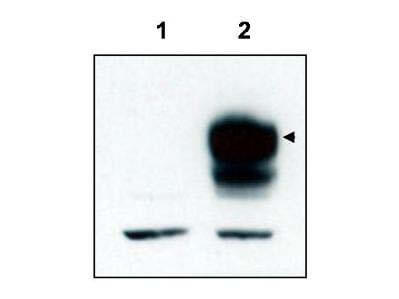Anti-TrkCT1 (RABBIT) Antibody
TrkCT1 Antibody
- SPECIFICATION
- CITATIONS
- PROTOCOLS
- BACKGROUND

| Host | Rabbit |
|---|---|
| Conjugate | Unconjugated |
| Target Species | Mouse |
| Reactivity | Human, Mouse |
| Clonality | Polyclonal |
Application
| WB, E, IP, I, LCI |
| Application Note | This affinity purified antibody has been tested for use in ELISA, IP, and western blotting. Specific conditions for reactivity should be optimized by the end user. While the predicted molecular weight for TrkCT1 is approximately 68 kDa, the protein has been reported to migrate at about 95 kDa on western blots. The molecular weight noted for TrkCT1 depends somewhat upon the cell lysate or extract used for western blotting, and this variation may be due to post-translational modifications of the protein. |
| Physical State | Liquid (sterile filtered) |
| Buffer | 0.02 M Potassium Phosphate, 0.15 M Sodium Chloride, pH 7.2 |
| Immunogen | This affinity purified antibody was prepared from whole rabbit serum produced by repeated immunizations with a synthetic peptide corresponding to amino acids near the carboxyl terminus of mouse TrkCT1 protein. |
| Preservative | 0.01% (w/v) Sodium Azide |
| Gene ID | 18213 |
|---|---|
| Other Names | 18213 |
| Purity | This affinity purified antibody is directed against mouse TrkCT1 protein. The product was affinity purified from monospecific antiserum by immunoaffinity chromatography. A BLAST analysis was used to suggest cross-reactivity with TrkCT1 protein from human, mouse and rat based on 100% homology with the immunizing sequence. Reactivity against homologues from other sources is not known. |
| Storage Condition | Store vial at -20° C prior to opening. Aliquot contents and freeze at -20° C or below for extended storage. Avoid cycles of freezing and thawing. Centrifuge product if not completely clear after standing at room temperature. This product is stable for several weeks at 4° C as an undiluted liquid. Dilute only prior to immediate use. |
| Precautions Note | This product is for research use only and is not intended for therapeutic or diagnostic applications. |
| Name | Ntrk3 |
|---|---|
| Synonyms | TrkC |
| Function | Receptor tyrosine kinase involved in nervous system and probably heart development. Upon binding of its ligand NTF3/neurotrophin-3, NTRK3 autophosphorylates and activates different signaling pathways, including the phosphatidylinositol 3-kinase/AKT and the MAPK pathways, that control cell survival and differentiation. |
| Cellular Location | Membrane; Single-pass type I membrane protein |
| Tissue Location | Isoform 2 expression is restricted to specific areas in adult brain. Isoform 3 transcripts are readily detected early during embryogenesis and are expressed predominantly in adult brain and gonads. |

Thousands of laboratories across the world have published research that depended on the performance of antibodies from Abcepta to advance their research. Check out links to articles that cite our products in major peer-reviewed journals, organized by research category.
info@abcepta.com, and receive a free "I Love Antibodies" mug.
Provided below are standard protocols that you may find useful for product applications.
Background
This antibody is designed, produced, and validated as part of a collaboration between Rockland and the National Cancer Institute (NCI) and is suitable for Cancer, Immunology and Nuclear Signaling research. TrkCT1, also named neurotrophic tyrosine kinase receptor type 3 (Ntrk3) non-catalytic isoform 2, is a non-catalytic isoform of TrkC, the high affinity receptor for Neurotrophin-3 (NT-3). This isoform lacks the kinase domain that is responsible for signaling by the full-length isoform. TrkCT1 is the product of an alternative splicing of Ntrk3 that leaves the extracellular and transmembrane domains intact but includes a shorter intracellular domain encoded by exons 13b and 14b. Recent studies indicate that the short cytoplasmic tail binds the scaffold protein Tamalin in a ligand-dependent manner and further activates the Arf6–Rac1 signaling pathway. Isoform 3 transcripts are readily detected early during embryogenesis and are expressed predominantly in adult brain and gonads.
If you have used an Abcepta product and would like to share how it has performed, please click on the "Submit Review" button and provide the requested information. Our staff will examine and post your review and contact you if needed.
If you have any additional inquiries please email technical services at tech@abcepta.com.













 Foundational characteristics of cancer include proliferation, angiogenesis, migration, evasion of apoptosis, and cellular immortality. Find key markers for these cellular processes and antibodies to detect them.
Foundational characteristics of cancer include proliferation, angiogenesis, migration, evasion of apoptosis, and cellular immortality. Find key markers for these cellular processes and antibodies to detect them. The SUMOplot™ Analysis Program predicts and scores sumoylation sites in your protein. SUMOylation is a post-translational modification involved in various cellular processes, such as nuclear-cytosolic transport, transcriptional regulation, apoptosis, protein stability, response to stress, and progression through the cell cycle.
The SUMOplot™ Analysis Program predicts and scores sumoylation sites in your protein. SUMOylation is a post-translational modification involved in various cellular processes, such as nuclear-cytosolic transport, transcriptional regulation, apoptosis, protein stability, response to stress, and progression through the cell cycle. The Autophagy Receptor Motif Plotter predicts and scores autophagy receptor binding sites in your protein. Identifying proteins connected to this pathway is critical to understanding the role of autophagy in physiological as well as pathological processes such as development, differentiation, neurodegenerative diseases, stress, infection, and cancer.
The Autophagy Receptor Motif Plotter predicts and scores autophagy receptor binding sites in your protein. Identifying proteins connected to this pathway is critical to understanding the role of autophagy in physiological as well as pathological processes such as development, differentiation, neurodegenerative diseases, stress, infection, and cancer.


